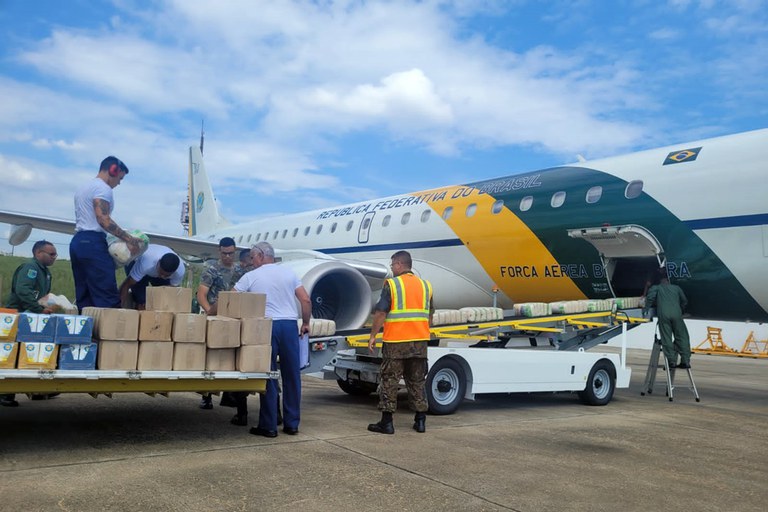Notícias
RETURNING IN PEACE
Brazil sends new cargo of humanitarian aid to the population of Gaza

Presidential aircraft being loaded with humanitarian aid kits to be taken to Gaza - Credit: GOV BR / FAB
A VC-2 aircraft from the Brazilian Presidency took off from Brasília for Egypt at 7:32 p.m. on Monday, October 30, carrying 1.5 tons of food for the population of Gaza. The food was offered by Brazil’s Landless Workers Movement (Movimento dos Trabalhadores Rurais Sem Terra/MST).
The VC-2 will replace another presidential aircraft of the same size that has been in Cairo for two weeks but must go back to Brazil over the next few days for maintenance. Therefore, after delivering the food, the plane that took off this Monday from Brazil will be available in Egypt for repatriation of the group of Brazilians awaiting the opening of the border in Gaza.
The shipment is humanitarian aid for the population of Gaza. The cargo is made up of rice, sugar, corn products and milk — and left Brazil for Egypt, where it will be handed over to the authorities responsible for taking it to Gaza.
This is the second mission by Brazil’s Returning in Peace Operation (Operação Voltando em Paz) which has sent humanitarian aid goods. The first occurred on October 18, when the VC-2 landed at Al-Arish International Airport in Egypt with water filtration equipment and health kits.
The cargo contained 40 water purifiers capable of treating more than 220 thousand liters of water a day. Manufactured by Brazil with Brazilian technology, the equipment is capable of removing 100% of viruses and bacteria from water. Access to drinking water is one of the biggest hardships faced by the population of Gaza today.
Two health kits were also sent, each serving up to 3,000 people over the course of a month. They contain medicine and supplies such as anti-inflammatory drugs, painkillers, antibiotics, gloves and syringes. Altogether, each kit contains 48 items, adding up to 267 kilos.
After being checked by the Egyptian Ministry of Foreign Affairs, the kits were handed over to the Red Crescent, a humanitarian movement that was founded in Geneva, Switzerland, in 1863, and is not connected to any State. The Red Crescent took on the responsibility for coordinating transport logistics, the border crossing and deliveries to Gaza.
ANXIETY – Currently, a group of around 30 Brazilians is awaiting the opening of the Gaza border with Egypt for repatriation to Brazil. According to Ambassador Alessandro Candeas — who is responsible for Brazil’s Representative Office in Ramallah, in the West Bank —, the humanitarian crisis has become more intense and the situation in the cities of Khan Yunis and Rafah, where the Brazilians are, is worrying.
“We are struggling to prevent these Brazilian citizens from being affected by the humanitarian catastrophe that is occurring in Gaza. We rented houses and managed to send funds for food, water, gas and medicine in the precarious local market. We are offering remote support from a psychologist and a doctor. Unfortunately, the prospects are for rapid degradation of living and safety conditions,” said Alessandro Candeas.
The Brazilian Federal Government's expectation is that the border with Egypt may be opened as soon as possible, so that Brazilians can reach Cairo and board another Returning in Peace Operation flight to Brazil. “The Brazilians must be authorized by the involved parties to leave as quickly as possible so that they may return safely to Brazil,” highlighted the ambassador.
1,413 REPATRIATED CITIZENS – So far, the Brazilian Federal Government's Returning in Peace Operation has ensured the safe return of 1,413 passengers on eight Brazilian Air Force (Força Aérea Brasileira/FAB) flights from Israel. Of this total, 1,410 were Brazilian and three were Bolivian, alongside 53 pets.
ARTICULATION – Brazilian diplomacy and President Luiz Inácio Lula da Silva remain directly involved in negotiations to guarantee humanitarian aid in the region, to negotiate a ceasefire and to allow the opening of the border so that Brazilians, other foreigners and civilians who want to leave the conflict zone may do so.
Brazil presides over the UN Security Council in October and has acted repeatedly to try to approve a consensual resolution that will help lead to dialogue and peace in the region. On Monday, another step in this process was taken by means of another emergency meeting toward this consensus.
Since the beginning of the conflict, on October 7, President Lula has had conversations over the phone with leaders from the United Arab Emirates, Israel, Palestine, Egypt, France, Russia, Turkey, Iran, Qatar and the European Council.
Brazil’s Minister of Foreign Affairs Mauro Vieira was also involved in conversations with the foreign ministers of Israel and Egypt, who are responsible for the border. “The issue is being dealt with at the highest political level. The full opening of a humanitarian corridor by the UN should help. There are hundreds of foreigners in the same situation as the Brazilians,” highlighted Candeas.